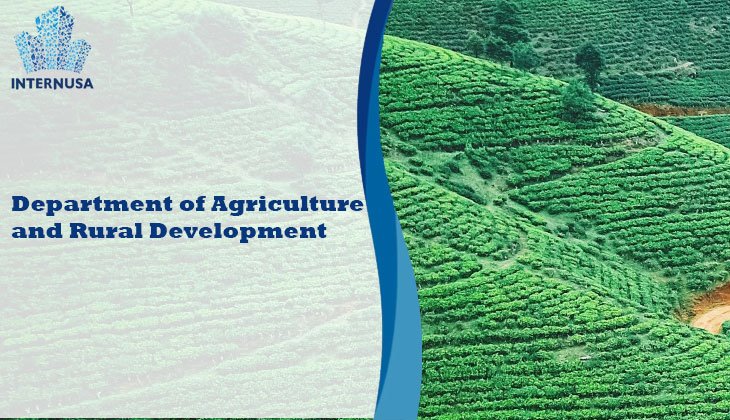Department of Agriculture and Rural Development
Department of Agriculture and Rural Development: The Main Pillar in Rural Development The Department of Agriculture and Rural Development is a government agency that plays a central role in managing and developing the agricultural sector and improving the welfare of rural communities. This department functions to formulate policies, manage programs, and ensure that there is no inclusive and sustainable agricultural and rural development. In this article, we will discuss various important aspects of the Department of Agriculture and Rural Development, including its functions, roles, challenges, and the impacts of the policies taken.
1. Main Functions and Duties
The Department of Agriculture and Rural Development has various duties that cover all aspects related to agriculture and rural development. The main functions of this department include:
- Policy Formulation The Department of Agriculture is responsible for formulating policies that encourage increased agricultural production, natural resource management, and farmer empowerment. These policies must take into account environmental extinction, food security, and food price stability in the domestic market.
- Rural Infrastructure Development The development of rural infrastructure, such as roads, irrigation, and agricultural storage facilities, is the main focus of this department. Adequate infrastructure is essential to improve accessibility, efficiency of agricultural product distribution, and minimize post-harvest losses.
- Extension and Training The Department of Agriculture is also responsible for providing extension and training to farmers on modern agricultural techniques, efficient use of fertilizers, pest management, and sustainable agricultural practices. This extension program aims to increase farmer productivity and income.
- Empowerment of Rural Communities In addition to agriculture, the Department also has a role in empowering rural communities through programs that support rural economic diversification, such as the development of small and medium enterprises (SMEs), handicrafts, and rural tourism.
2. Role in Sustainable Agriculture Development
Sustainable agriculture is one of the main focuses of the Department of Agriculture and Rural Development. With increasing pressure on natural resources and climate change, the Department plays an important role in ensuring that agricultural practices carried out by farmers can maintain the balance of the ecosystem.
- Promotion The Department of Organic Agriculture encourages the use of environmentally friendly organic farming, reduces the use of excessive pesticides and chemical fertilizers, and promotes the use of natural materials to maintain soil fertility and air quality.
- Natural Resource Management Natural resource management, such as air, land, and forests, is a priority in this policy department. Good agricultural practices must be in line with environmental conservation to prevent land degradation, deforestation, and biodiversity loss.
- Climate Change Management The department also works to develop strategies for adaptation and mitigation to climate change. This includes research and development of crop varieties that are resilient to climate change, as well as reducing greenhouse gas emissions from the agricultural sector.
3. Challenges Faced
Despite its critical role, the Department of Agriculture and Rural Development faces a variety of complex challenges in carrying it out. Some of the main challenges include:
- Inequality of Rural and Urban Development One of the biggest challenges is reducing the inequality between rural and urban areas. Inadequate infrastructure, limited access to basic services, and high levels of poverty in rural areas are often major obstacles to improving the welfare of rural communities.
- Climate Change and Natural Disasters Climate change has significant impacts on the agricultural sector, such as droughts, floods, and changes in unpredictable weather patterns. The Department must continue to develop adaptive strategies to address these risks.
- Food Security Food security is a global challenge faced by every country. The Department of Agriculture and Rural Development must ensure that food production is sufficient to meet national needs, while maintaining affordable food prices for the community.
- Agricultural Modernization Agricultural modernization through the application of new technologies and innovations is often constrained by farmers’ limited access to capital, training, and technological infrastructure. The Department needs to continue to encourage the use of appropriate technology to improve agricultural efficiency and productivity.
4. Impact of Policies and Programs
The policies and programs issued by the Department of Agriculture and Rural Development have a broad impact on society and the economy. The positive impacts include
a. Increasing Agricultural Production
Through agricultural intensification programs, introduction of superior varieties, and farmer training, this department has succeeded in increasing national food production, thereby contributing to food security and economic stability.
b. Increasing Rural Community Welfare
The empowerment programs run by this department have succeeded in increasing the income and welfare of rural communities, reducing poverty levels, and improving their quality of life.
c. Environmental Conservation
Through policies that focus on sustainable agriculture, this department has succeeded in reducing negative impacts on the environment, such as land degradation and water pollution, and increasing natural resource conservation.
d. Rural Economic Diversification
The economic diversification program managed by this department has provided new opportunities for rural communities to develop businesses outside the agricultural sector, such as the creative industry, tourism, and SMEs, thereby reducing dependence on the agricultural sector alone.
5. The Future of Agriculture and Rural Development
Looking ahead, the Department of Agriculture and Rural Development must continue to adapt to global and domestic changes. This includes the application of digital technology in agriculture, the development of data-driven smart agriculture, and increased community involvement in the planning and implementation of development programs.
The department must also increasingly focus on social inclusion, ensuring that policies taken can provide equitable benefits to all levels of society, including vulnerable groups such as women, children, and minorities in rural areas.
In facing increasingly complex challenges, collaboration with various parties, including the private sector, research institutions, and civil society organizations, is key to success in achieving sustainable development goals.
Main Pillar in the Agricultural Sector
The Department of Agriculture and Rural Development is a key pillar in the development of the agricultural sector and improving the welfare of rural communities. With the various functions and roles carried out, this department has a significant impact on food security, environmental sustainability, and rural economic development. Despite facing various challenges, the department’s commitment to inclusive and sustainable development will continue to be the foundation for achieving equitable prosperity for all people.







